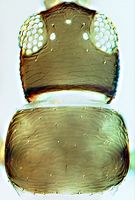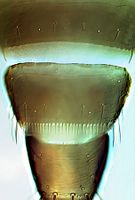Difference between revisions of "Anaphothrips badius"
From Thrips Wiki
(Created page with "== Nomenclatural details == == Biology and Distribution == == References == == Type information ==") |
|||
| (14 intermediate revisions by 2 users not shown) | |||
| Line 1: | Line 1: | ||
| + | <gallery> | ||
| + | File:Anaphothr badius hdpro.jpg|Anaphothrips badius head & pronotum | ||
| + | File:Anaphothr badius viii.jpg|Anaphothrips badius tergites vii-ix | ||
| + | File:Anaphothr badius ant.jpg|Anaphothrips badius antenna | ||
| + | </gallery> | ||
| + | |||
== Nomenclatural details == | == Nomenclatural details == | ||
| + | ''Euthrips badius'' Williams, 1913: 221. | ||
| + | |||
| + | ''Anaphothrips badius'' var. ''pectens'' Bagnall, 1923: 57. | ||
| + | |||
== Biology and Distribution == | == Biology and Distribution == | ||
| + | Described from England, living in grasses. | ||
| + | |||
== References == | == References == | ||
| + | Williams CB (1913) Records and descriptions of British Thysanoptera. ''Journal of Economic Entomology'' 8: 216-230. | ||
| + | |||
| + | Bagnall RS (1923) A contribution towards a knowledge of the British Thysanoptera, with descriptions of new species. ''Entomologist's monthly Magazine'' 59: 56–60. | ||
| + | |||
== Type information == | == Type information == | ||
| + | Holotype female (''E. badius''), Albany Museum, Grahamstown; paratype females in Senckenberg Museum, Frankfurt. | ||
| + | |||
| + | Holotype female (''A. pectens''), The Natural History Museum, London. | ||
| + | |||
| + | [[category: Anaphothrips species]][[category: Thripinae species]][[category:Thysanoptera species extant]] | ||
Latest revision as of 06:48, 31 October 2022
Nomenclatural details
Euthrips badius Williams, 1913: 221.
Anaphothrips badius var. pectens Bagnall, 1923: 57.
Biology and Distribution
Described from England, living in grasses.
References
Williams CB (1913) Records and descriptions of British Thysanoptera. Journal of Economic Entomology 8: 216-230.
Bagnall RS (1923) A contribution towards a knowledge of the British Thysanoptera, with descriptions of new species. Entomologist's monthly Magazine 59: 56–60.
Type information
Holotype female (E. badius), Albany Museum, Grahamstown; paratype females in Senckenberg Museum, Frankfurt.
Holotype female (A. pectens), The Natural History Museum, London.

